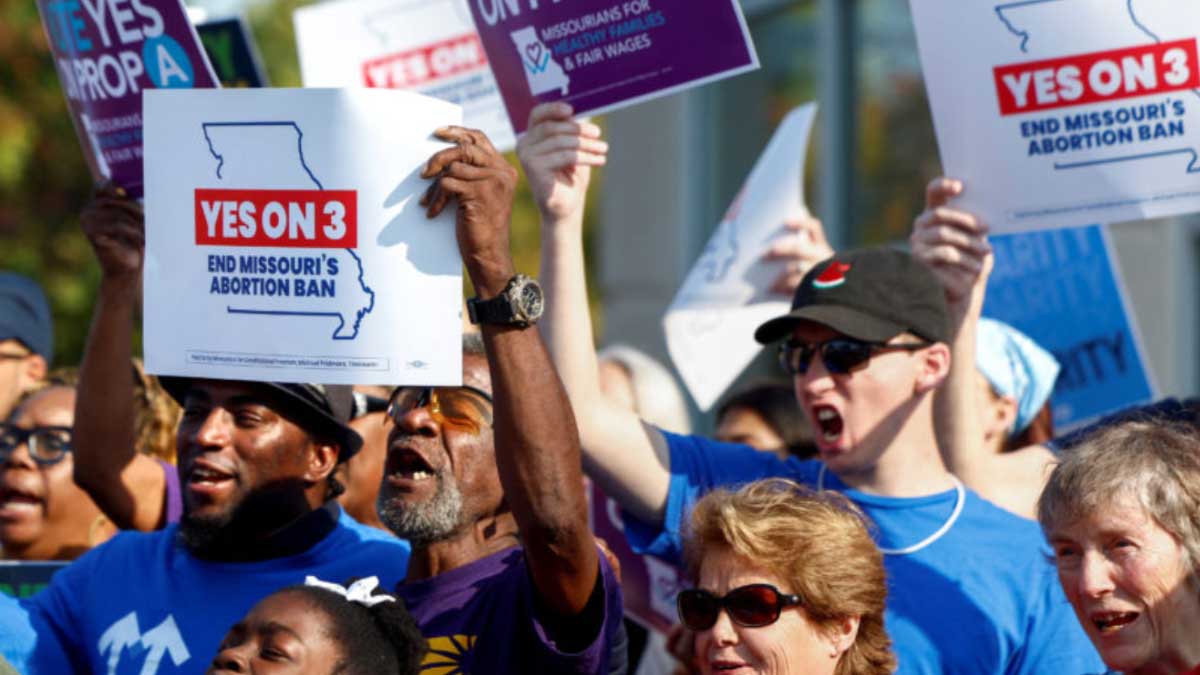- Home
- Billionaires
- Investing Newsletters
- 193CC 1000
- Article Layout 2
- Article Layout 3
- Article Layout 4
- Article Layout 5
- Article Layout 6
- Article Layout 7
- Article Layout 8
- Article Layout 9
- Article Layout 10
- Article Layout 11
- Article Layout 12
- Article Layout 13
- Article Layout 14
- Article Sidebar
- Post Format
- pages
- Archive Layouts
- Post Gallery
- Post Video Background
- Post Review
- Sponsored Post
- Leadership
- Business
- Money
- Small Business
- Innovation
- Shop
Recent Posts
Abortion Ballot Results: Florida Rejects, Arizona Approves

In a significant series of votes on abortion rights across the U.S., several states weighed in on ballot measures that could shape the landscape of reproductive rights for years to come. These measures, appearing on ballots Tuesday, presented voters with choices on abortion access and restrictions in the wake of the Supreme Court’s decision to overturn Roe v. Wade. The results were mixed: while some states affirmed abortion rights with new amendments, others upheld existing restrictions.
In Florida, Amendment 4 was proposed to amend the state’s Constitution to ensure that no law could restrict abortion before viability or when necessary to protect the patient’s health. This amendment, which also sought to overturn the state’s existing six-week abortion ban, ultimately garnered 57% of the vote by Tuesday night—just shy of the 60% threshold needed to pass. Advocates of Amendment 4 expressed disappointment, noting that the vote showed a majority of Floridians favor abortion rights, even if the margin was not sufficient for the measure’s passage. Floridians Protecting Freedom, a leading advocacy group, issued a statement highlighting that despite the amendment’s failure, the majority of voters have indicated opposition to restrictive abortion laws.
In Arizona, Proposition 139 was a victory for abortion rights advocates. Receiving 62.3% support, this proposition established a “fundamental right to abortion” within the state Constitution, which would prohibit the state from banning abortions prior to fetal viability and overturn Arizona’s 15-week ban. By embedding abortion rights in the state Constitution, Arizona voters have ensured that future legislative attempts to impose severe restrictions will face a significant legal barrier.
Missouri voters also weighed in on abortion rights, with 53% supporting the Right to Reproductive Freedom amendment, which establishes a “fundamental right to reproductive freedom.” This measure overrides the state’s near-total abortion ban, now stipulating that Missouri cannot interfere with an individual’s decision regarding abortion or prosecute anyone for obtaining or assisting in an abortion. In this conservative state, the amendment represents a notable shift toward safeguarding reproductive freedoms, defying opposition from anti-abortion groups.
In Colorado, voters approved the Right to Abortion proposal by 61.5%, embedding the right to abortion within the state Constitution. This amendment explicitly prevents the state from denying health insurance coverage for abortion, ensuring access remains broadly protected in a state with relatively few abortion restrictions. Colorado’s move signals a solidification of its stance on protecting reproductive rights, following trends seen in other states where voters have rallied against abortion bans.
Maryland’s Right to Reproductive Freedom amendment won overwhelming support, with 74% of voters in favor. This measure updates the state Constitution to guarantee the right to reproductive freedom, including decisions to continue or terminate a pregnancy. Though abortion is already legal in Maryland, the new constitutional language serves as a further bulwark against potential restrictions, solidifying Maryland’s status as a pro-choice state.
New York voters approved the Equal Protection of Law amendment with 72.3% support, expanding anti-discrimination protections in the state’s Constitution to include pregnancy, pregnancy outcomes, and reproductive healthcare autonomy. This measure not only affirms the state’s pro-choice stance but also enhances protections against discrimination, embedding broader reproductive rights into the fabric of New York law.
In Montana, the Constitutional Initiative No. 128 appeared likely to pass with 58.2% support as of Tuesday night. This initiative would permit abortion until fetal viability, or later if medically necessary, by explicitly establishing the right to make personal decisions about pregnancy in the state Constitution. In a state where abortion access had previously been upheld by court rulings, this amendment provides additional assurance that abortion rights will not be curtailed.
Nebraska, in a split vote on two abortion-related measures, leaned toward anti-abortion policy. A measure to enshrine the state’s 12-week abortion ban within the state Constitution passed with 53.8% support, making it one of the most restrictive abortion measures affirmed by voters this election cycle. The restriction allows exceptions only in cases of rape, incest, or medical emergencies. Meanwhile, a competing pro-abortion access measure, which would have legalized abortion up to viability, narrowly failed with only 49% support. These results illustrate a state deeply divided on the issue, yet ultimately reinforcing restrictive abortion policies.
In Nevada, the Right to Abortion Initiative received strong support, with 63.3% of votes cast in favor. This measure guarantees the right to abortion until viability or when necessary to protect the pregnant person’s life or health. Already a state with legal abortion access, Nevada’s approval of this initiative reflects a commitment to maintaining reproductive rights long-term. However, to become fully enacted, the measure will need to be voted on again during the 2026 midterms.
South Dakota rejected Amendment G, with 61% of voters voting against it. The amendment sought to repeal the state’s abortion ban and institute escalating restrictions based on pregnancy stages. Under its terms, first-trimester abortions would have been unrestricted, second-trimester abortions would require a health-related reason, and third-trimester abortions would be permitted only to protect the pregnant person’s life or health. The failure of this measure keeps South Dakota’s current abortion ban in place.
The political implications of these abortion ballot measures could be far-reaching, particularly for the upcoming presidential election. Vice President Kamala Harris and former President Donald Trump could each find their campaign trajectories influenced by these results. Historically, abortion ballot measures have driven Democratic voter turnout, as supporters of reproductive rights rally around such amendments. However, Trump campaign representatives believe these measures may actually assist their candidate, as some voters could prioritize securing abortion rights at the state level, thereby feeling less inclined to vote on that issue in the presidential race itself. Polling data suggests a segment of voters may choose to support state-level abortion protections while also backing Trump, who has a history of anti-abortion policies. This dynamic could shape the race in key swing states like Arizona and Nevada, where abortion remains a highly mobilizing issue for voters.
The trend in recent years shows that voters, even in conservative-leaning states, are often more likely to support measures protecting abortion access. An October poll by YouGov revealed that 56% of U.S. voters would support a ballot measure enshrining the right to abortion up to fetal viability, though many also support banning later-term abortions except in cases of rape, incest, or medical emergencies. This mixed sentiment underlines the complexity of abortion politics across the country.
Notably, anti-abortion advocates and Republican lawmakers in several states attempted to prevent these measures from appearing on ballots, filing lawsuits and challenging signatures. In Florida, Republican Governor Ron DeSantis led opposition to Amendment 4, launching an investigation into signature-gathering efforts and encouraging state agencies to campaign against the measure. These tactics underscore the intense efforts to stymie abortion rights advocacy, despite significant public support for access.
As states continue to weigh in on this polarizing issue, abortion ballot measures remain a key tool for advocates seeking to preserve or expand abortion rights, particularly in states where legislatures may be more resistant to pro-choice legislation. This series of votes reinforces a national divide on reproductive rights, and as more states consider ballot measures, the role of public opinion in shaping abortion policy will likely remain central in the U.S. political landscape.
Recent Posts
Categories
- 193 Countries Consortium Partner1
- 193cc Digital Assets2
- 5G1
- Aerospace & Defense48
- AI37
- Arts3
- Banking & Insurance11
- Big Data3
- Billionaires1,467
- Boats & Planes1
- Business332
- Careers13
- Cars & Bikes79
- CEO Network1
- CFO Network17
- CHRO Network1
- CIO Network1
- Cloud10
- CMO Network18
- Commercial Real Estate7
- Consultant1
- Consumer Tech194
- CxO1
- Cybersecurity73
- Dining1
- Diversity, Equity & Inclusion4
- Education7
- Energy8
- Enterprise Tech29
- Events11
- Fintech1
- Food & Drink2
- Franchises1
- Freelance1
- Future Of Work2
- Games149
- GIG1
- Healthcare79
- Hollywood & Entertainment203
- Houses1
- India’s 1000 Richest1
- Innovation46
- Investing2
- Investing Newsletters4
- Leadership65
- Lifestyle11
- Manufacturing1
- Markets20
- Media327
- Mobile phone1
- Money13
- Personal Finance2
- Policy569
- Real Estate1
- Research6
- Retail1
- Retirement1
- Small Business1
- SportsMoney42
- Style & Beauty1
- Success Income1
- Taxes2
- Travel10
- Uncategorized14
- Vices1
- Watches & Jewelry2
- world's billionaires1,436
- Worlds Richest Self-Made Women2
Related Articles
South Korea Plane Crash: A Tragic Loss and Global Mourning
The tragic plane crash at South Korea’s Muan International Airport on Sunday...
By 193cc Agency CouncilDecember 30, 2024H-1B Visa Debate Splits Trump Allies and Silicon Valley
The debate over H-1B visas has once again become a contentious issue,...
By 193cc Agency CouncilDecember 28, 2024Trump Moves $4B Stake in Truth Social Parent, Stock Drops 6%
Donald Trump recently transferred his 57% stake in Trump Media & Technology...
By 193cc Agency CouncilDecember 20, 2024House Rejects Trump-Backed Funding Bill, Shutdown Looms
The U.S. House of Representatives rejected a new government funding bill on...
By 193cc Agency CouncilDecember 20, 2024















Leave a comment